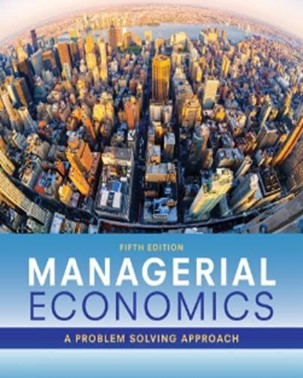MANAGERIAL ECONOMICS
By Srinivas R Rao
This book is on MANAGERIAL ECONOMICS which is a compulsory subject for Commerce students. Even the higher-level students and bachelor level students can also read it as it contains a lot of numerical problems framed by me.
Lesson I The Fundamentals Of Managerial Economics
Why study Economics?
Managerial Economics
Nature of Managerial Economics
Circular flow of economic activity
Objectives of the firm
Review questions!
People have limited number of needs which must be satisfied if they are to survive as human beings. Some are material needs, some are psychological needs, and some others are emotional needs.
People’s needs are limited; however, no one will choose to live at the level of basic human needs if they want to enjoy a better standard of living. This is because human wants (desire for the consumption of goods and services) are unlimited.
It doesn’t matter whether a person belongs to the middle class in India or is the richest individual in the World, he or she wants always something more. For example, bigger a house, more friends, more salary etc., Therefore the basic economic problem is that the resources are limited but wants are unlimited which forces us to make choices.
Economics is the study of this allocation of resources, the choices that are made by economic agents. An economy is a system which attempts to solve this basic economic problem. There are different types of economies; household economy, local economy, national economy and international economy but all economies face the same problem.
The major economic problems are (i) what to produce? (ii) How to produce? (iii) When to produce and (iv) For whom to produce?
Economics is the study of how individuals and societies choose to use the scarce resources that nature and the previous generation have provided. The world’s resources are limited and scarce. The resources which are not scarce are called free goods. Resources which are scarce are called economic goods.
Why Study Economics?
A good grasp of economics is vital for managerial decision making, for designing and understanding public policy, and to appreciate how an economy functions. The students need to know how economics can help us to understand what goes on in the world and how it can be used as a practical tool for decision making.
Managers and CEO’s of large corporate bodies, managers of small companies, nonprofit organizations, service centers etc., cannot succeed in business without a clear understanding of how market forces create both opportunities and constraints for business enterprises.
Reasons For Studying Economics:
Ֆ It is a study of society and as such is extremely important.
Ֆ It trains the mind and enables one to think systematically about the problems of business and wealth.
Ֆ From a study of the subject it is possible to predict economic
trends with some precision.
Ֆ It helps one to choose from various economic alternatives.
Economics is the science of making decisions in the presence of scarce resources. Resources are simply anything used to produce a good or service to achieve a goal. Economic decisions involve the allocation of scarce resources so as to best meet the managerial goal. The nature of managerial decision varies depending on the goals of the manager.
A Manager is a person who directs resources to achieve a stated goal and he/she has the responsibility for his/her own actions as well as for the actions of individuals, machines and other inputs under the manager’s control.
Managerial economics is the study of how scarce resources are directed most efficiently to achieve managerial goals. It is a valuable tool for analyzing business situations to take better decisions.
Prof. Evan J Douglas defines Managerial Economics as “Managerial Economics is concerned with the application of economic principles and methodologies to the decision-making process within the firm or organization under the conditions of uncertainty.”
According to Milton H Spencer and Louis Siegelman “Managerial Economics is the integration of economic theory with business practices for the purpose of facilitating decision making and forward planning by management.”
According to Mc Nair and Miriam, ‘Managerial Economics consists of the use of economic modes of thoughts to analyze business situations’.
Economics can be divided into two broad categories: microeconomics and macroeconomics. Macroeconomics is the study of the economic system as a whole. It is related to issues such as determination of national income, savings, investment, employment at aggregate levels, tax collection, government expenditure, foreign trade, money supply etc.,
Microeconomics focuses on the behavior of the individuals, firms and their interaction in markets. Managerial economics is an application of the principles of micro and macroeconomics in managerial decision making.
The economic way of thinking about business decision making provides all managers with a powerful set of tools and insights for furthering the goals of their organization. Successful managers take good decisions, and one of their most useful tools is the methodology of managerial economics.
Nature Of Managerial Economics:
1. Managerial economics is concerned with the analysis of finding optimal solutions to decision making problems of businesses/ firms (micro economic in nature).
2. Managerial economics is a practical subject therefore it is
pragmatic.
3. Managerial economics describes, what is the observed economic phenomenon (positive economics) and prescribes what ought to be (normative economics)
4. Managerial economics is based on strong economic concepts.
(conceptual in nature)
5. Managerial economics analyses the problems of the firms in the perspective of the economy as a whole (macro in nature)
6. It helps to find optimal solution to the business problems (problem solving)
Managerial Economics And Other Disciplines
Managerial economics has its relationship with other disciplines for propounding its theories and concepts for managerial decision making. Essentially it is a branch of economics. Managerial economics is closely related to certain subjects like statistics, mathematics, accounting and operations research.
Managerial economics helps in estimating the product demand, planning of production schedule, deciding the input combinations, estimation of cost of production, achieving economies of scale and increasing the returns to scale. It also includes determining price of the product, analyzing market structure to determine the price of the product for profit maximization, which helps them to control and plan capital in an effective manner.
Successful mangers make good decisions, and one of their most useful tools is the methodology of managerial economics. Warren E Buffett, the renowned chairman and CEO of Berkshire Hathaway Inc., invested $100 and went on to accumulate a personal net worth of $30 billion. Buffett credits his success to a basic understanding of managerial economics. Buffett’s success is a powerful testimony to the practical usefulness of managerial economics.
READ MUCH MORE INSIDE...
“MANAGERIAL ECONOMICS” $54.87

Click on the Purchase Button Below for Instant Access!
 If for any reason you decided within 30 days that “MANAGERIAL ECONOMICS” isn’t for you, simply notify us by email and we’ll gladly refund your money – no questions asked. That’s our Ironclad Guarantee!
If for any reason you decided within 30 days that “MANAGERIAL ECONOMICS” isn’t for you, simply notify us by email and we’ll gladly refund your money – no questions asked. That’s our Ironclad Guarantee!
The risk is entirely ours! You absolutely have nothing to lose!
![]()
Your name and email will Never be shared, sold, or given to anyone.
We keep our subscriber’s privacy sacred. We do not sell or rent your personal information to other parties. What’s more you can always unsubscribe at any time!
Warmest Regards, Coyalita
Copyright © 2021 – 2024 U.S.A. Ads Coyalitalinville.com All Rights Reserved Privacy Policy – Earnings Disclaimer – Terms of Use – Contact Us
